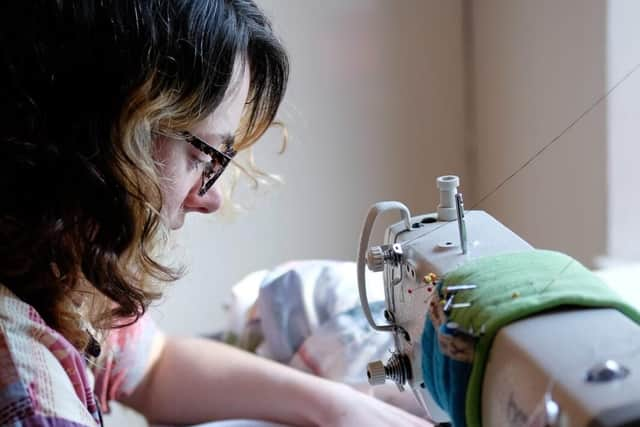The Bob Cratchit Effect: rise in demand for time off at Christmas fuelled by cost-of-living crisis
and live on Freeview channel 276
Seven out of 10 small business owners (70%) have spent less time with family and friends while facing challenges caused by the cost-of-living crisis, according to a survey.
Half of entrepreneurs (47%) said their work/life balance had changed over the past 12 months and 34% said they have been forced to spend less time with a partner.
Advertisement
Hide AdAdvertisement
Hide AdJust 23% of small business owners said they had stopped work at Christmas before the cost-of-living crisis began.


But that figure has risen by 10% this year as more small businesses are set to close over the festive period.
The rise has been called ‘The Bob Cratchit Effect’ after the character in A Christmas Carol, which was published 180 years ago this month.
Cratchit is an overworked and underpaid clerk of the miserly Ebenezer Scrooge and pleads with his boss for Christmas Day off to spend time with his family.
Advertisement
Hide AdAdvertisement
Hide AdThe endearing popularity of Charles Dickens’ Victorian ghost story has added the trimmings to a traditional Christmas enjoyed by millions around the world.


While economic uncertainty looms like the Ghost of Christmas Yet to Come, it seems the spirited message to prioritise family over business has been heard louder than ever.
The survey was conducted by digital practice The Accountancy Partnership, who polled 1,200 small business owners about their work and mental health over the past 12 months.
A huge 60% of small business owners said spending time with family and friends was the best way to cope with stress during the busy Christmas period.
Advertisement
Hide AdAdvertisement
Hide AdExercise was the second most popular choice, after spending time with family and friends, for 49% and 40% of those polled said walking helped with stress.


Mental health issues are a serious concern with anxiety being a condition 45% said they suffered to cope with while running their business.
Four in 10 admitted to suffering from burnout and 22% had struggled with insomnia.
A bleak statistic shows 30% of small business owners have become socially withdrawn because of running a business.
Advertisement
Hide AdAdvertisement
Hide AdWhile 71% said coping strategies hadn’t changed, there has been an increase in keeping fit for 54% and 28% said they had started to practice meditation to beat stress.
Hopes of a fresh start in the new year seem to be fading as falling sales haunt 54% of small business owners, with 44% concerned about inflation.
Increased business rates are a concern for 27% and 25% admitted to being worried about rising energy costs.
Callum Dee, 29, is a full-time director of The Bald Viking Beard Company, which he founded five years ago, and has been unable to pay himself since January.
Advertisement
Hide AdAdvertisement
Hide AdThe father-of-two will be focussing on his online sales to meet demand after sales at his market stalls dropped dramatically this year and is unable to take time off.
Married Callum, who lives in Welwyn Garden City, said: “I have had a bit of stress this year because I have been unable to pay myself and this has put pressure on the business.
“Sales at the markets have dropped even though footfall has not necessarily fallen, people just aren’t buying.”
Becky Harrison founded her soft-furnishings company Sew Versatile Sewing, based near Halifax in West Yorkshire, after becoming a self-employed seamstress nine years ago.
Advertisement
Hide AdAdvertisement
Hide AdThe 36-year-old said: “The cost-of-living crisis has meant everything’s a little closer to the wire, financially.
“It’s meant we’ve had to raise our prices on items, not to make a better living for ourselves but just to cover our increasing material costs and overheads.
“As purse strings tighten up, our target audience has narrowed. We make luxury items, so something that’s only purchased when there’s money to spare.
“It’s been harder work to find new leads and to get those leads all the way to the purchasing stage.”
Advertisement
Hide AdAdvertisement
Hide AdLee Murphy, Managing Director of TAP, who are based on Wirral, said: “Small business owners and entrepreneurs are working harder throughout the year.
“Spending time with loved ones is a more of a priority this Christmas. It is likely that this trend is not unique to the self-employed.
“If economic crises continue to shape our lives, the workforce will be committing more time away from family.
“The spirit of Christmas will grow stronger and an important period to renew relationships with missed loved ones.
Advertisement
Hide AdAdvertisement
Hide Ad“Our team have called the rise in small business owners taking time off at Christmas ‘The Bob Cratchit Effect’.
“The research suggests we are a nation of Cratchit’s and despite the concerns caused by the cost-of-living crisis the ways of Scrooge have been shunned.
“That’s something to celebrate this year.”
Sarah Merrington, Head of the Mental Health at Work programme at Mind, said: “We know it can be difficult to prioritise your mental health.
“If you’re a small business owner, you don't have the support of employer mental health services and might have little time to spare to focus on yourself.
Advertisement
Hide AdAdvertisement
Hide Ad“The results expose a mental health crisis, with over half of respondents struggling with poor mental health in the last year, many experiencing insomnia, working long hours, and very rarely taking breaks - it’s a recipe for burnout.
“It's so important that self-employed people have somewhere to go for help.
“That's why, together with Simply Business, we have set up a free mental health hub which provides accessible, bespoke support, to enable the self-employed to make positive changes to their mental health.”